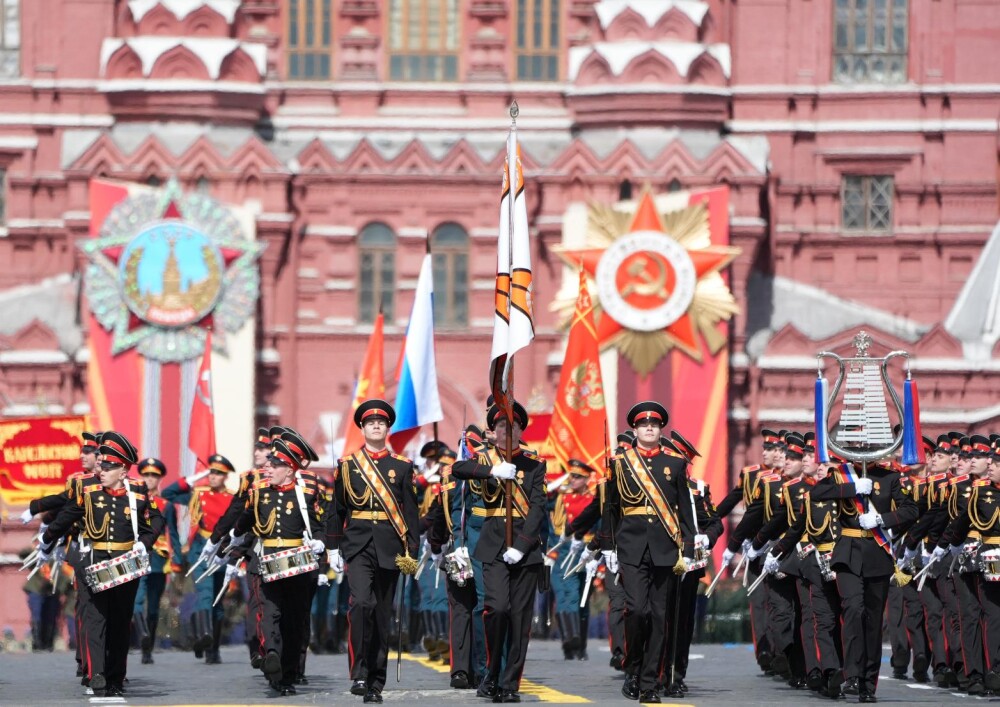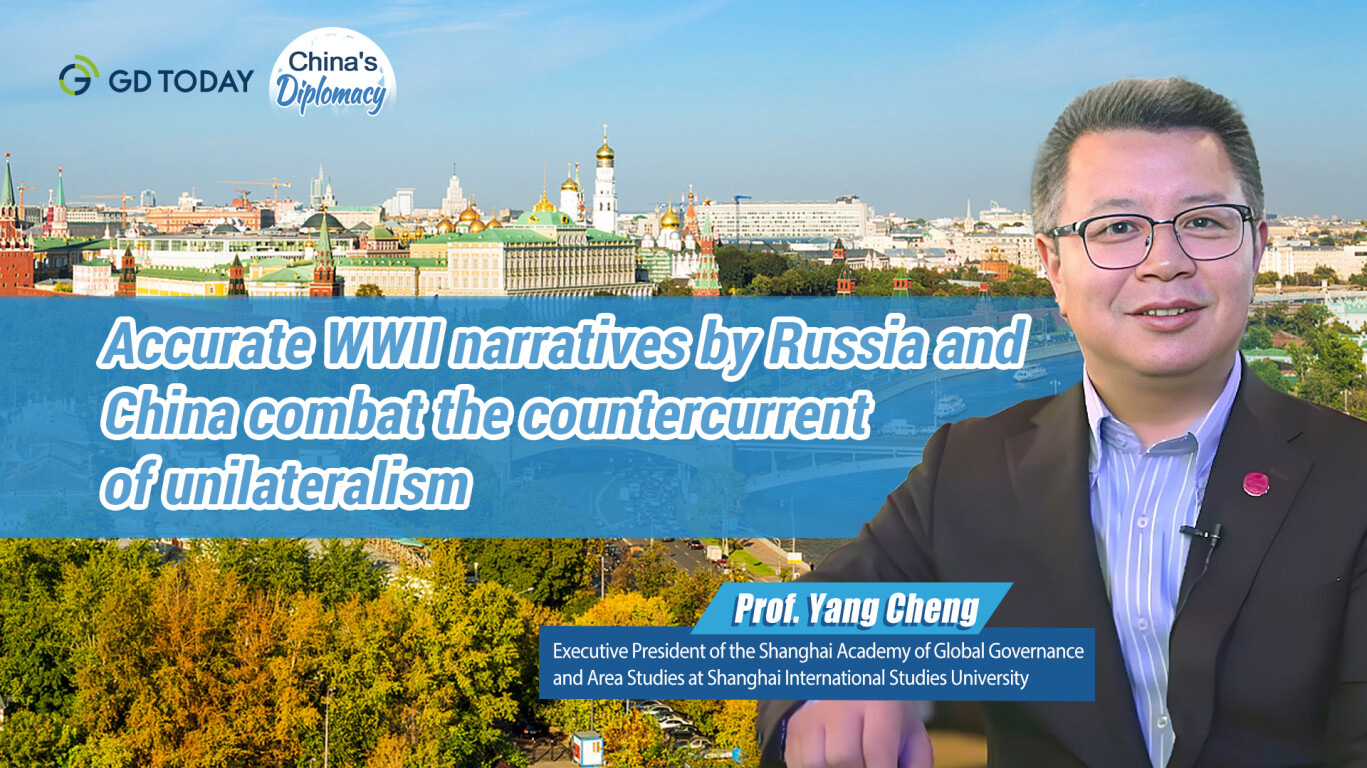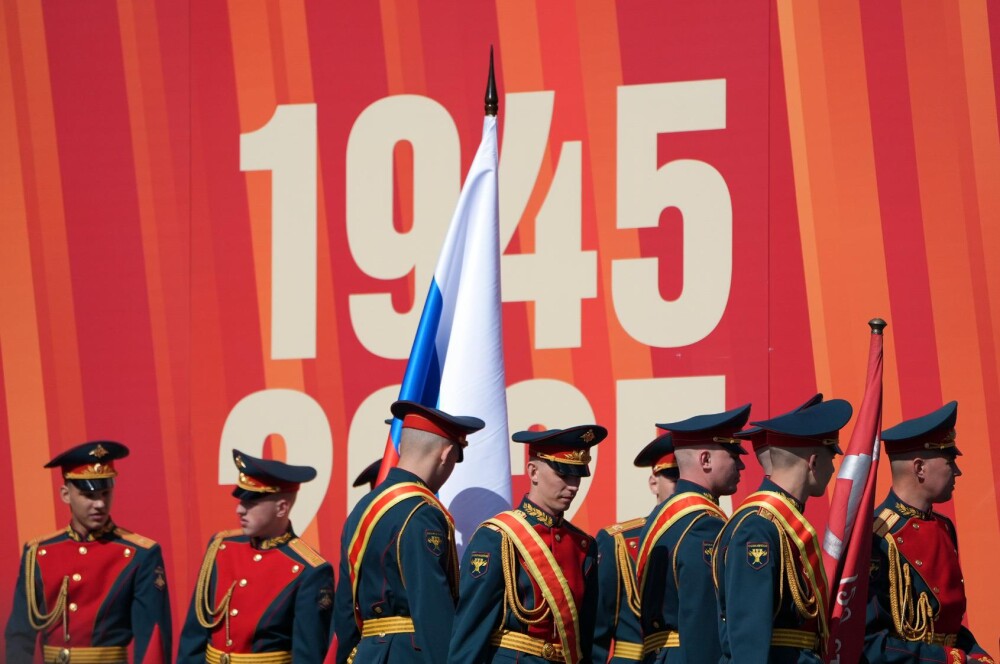From May 7 to 10, Chinese President Xi Jinping is paying a state visit to Russia where he attended the celebrations marking the 80th anniversary of the Victory in the Soviet Union's Great Patriotic War in Moscow on May 9.
The Chinese leader attended a grand parade at Red Square to mark the special occasion along with leaders from 29 countries and international organizations.
The visit at the invitation of Russian President Vladimir Putin, was highlighted by key documents signed between the two sides, including a joint statement on further deepening the China-Russia comprehensive strategic partnership of coordination for a new era.

Soldiers march during a grand parade marking the 80th anniversary of the victory in the Soviet Union's Great Patriotic War in Moscow, Russia, May 9, 2025. (Photo: Xinhua)
"By commemorating World War II (WWII) together, China and Russia show the longing for peace and vigilance against war in modern days," said Prof. Yang Cheng, Executive President of the Shanghai Academy of Global Governance and Area Studies at Shanghai International Studies University, as well as a former diplomat who served at the Embassy of China in Russia.
He holds that the occasion shows how the international community seeks multilateralism, instead of unilateralism and hegemonism, calling for equal consultations and joint decision-making among nations.

Joint efforts in World Anti-Fascist War
During their meeting, the two leaders reaffirmed that China and Russia, as main theaters of Asia and Europe in WWII, have made decisive contributions to the victory of the World Anti-Fascist War 80 years ago. The two peoples have jointly made indelible historical contributions to the victory in the World Anti-Fascist War and forged an unbreakable great friendship with blood.
"The two sides emphasize shared and accurate narratives of WWII, and this will give recognition to the role of the Asian theater in the war, especially China. Such consensus works to deepen political mutual trust between China and Russia," commented Prof. Yang.
He added that China will work with Russia to shoulder the special responsibility as major countries of the world and permanent members of the UN Security Council, to combat the countercurrent of unilateralism and the acts of power politics and bullying in the world.
Responsibility as major countries amid world turbulence
Essential to the visit is the fact that the two leaders exchanged in-depth views on China-Russia relations and major international and regional issues, which produced consensus on maintaining the authority and status of the United Nations, and safeguarding international justice and fairness.
"That means the two countries jointly oppose unilateralism, reject the abuse of sanctions, and resist bloc confrontation. It helps safeguard the common interests of the international community," the professor said.

Soldiers at a grand parade marking the 80th anniversary of the victory in the Soviet Union's Great Patriotic War in Moscow, Russia, May 9, 2025. (Photo: Xinhua)
According to Yang, since Donald Trump's return to the White House, the United States has explicitly intensified efforts to drive a wedge between China and Russia. The current global landscape witnesses escalating deficits in development and governance, compounded by proliferating trust gaps between nations, ethnic groups, and individuals. These intersecting crises render international cooperation increasingly complex, exposing the structural contradictions within the existing world order.
Given such context, China's strategic engagement with Russia conclusively demonstrates that bilateral relations have transcended the post-Soviet era pattern of externally driven development, which predominantly relied on third-party pressures, Yang said.
"This evolution signifies that China-Russia ties will steadfastly advance along the trajectory charted by their leaders, deepening practical cooperation across all domains, reinforcing political mutual trust, and institutionalizing the bedrock for stable bilateral development," he analyzed.
As the current tariffs stir up global financial stability, the Russian side has made it clear that the two sides should enhance coordination and cooperation within multilateral frameworks such as the United Nations, the Shanghai Cooperation Organization, and BRICS, supporting the process toward a multipolar world.
Stronger commitment to practical cooperation
As part of the joint statement, the two countries have confirmed a strong commitment to practical cooperation across the board. It is stated that the two sides should take the synergy between the Belt and Road Initiative and the Eurasian Economic Union as a platform to build a high-standard connectivity pattern.
Additionally, the two countries should fully unleash the potential of the China-Russia Years of Culture, strengthen cooperation in education, film, tourism, sports, and local areas, and promote deep-rooted people-to-people connectivity.
In 2024, bilateral trade between China and Russia amounted to 244.8 billion U.S. dollars, making China the largest trading partner of Russia for 15 consecutive years. In December 2024, the China-Russia east-route natural gas pipeline was fully completed. Cooperation in emerging sectors such as the digital economy, e-commerce, and green energy has been expanding.
"Many might notice that countries like the United States and its Western allies have tried to stigmatize China's cooperation programs with Russia, whether in security, economic, or technological fields," Prof. Yang said. But in reality, he pointed out, China's partnership with Russia aligns fundamentally with that of numerous Global South nations – including India, Brazil, and Turkey – not an exceptional case.
The new bilateral agreements demonstrate both nations' commitment to advancing comprehensive, needs-driven practical cooperation across all domains, systematically reinforcing the institutional foundations for sustainable partnership development, he added.
Reporter | Guo Zedong
Poster | Cai Junru
Editor | Yuan Zixiang, James, Shen He
















